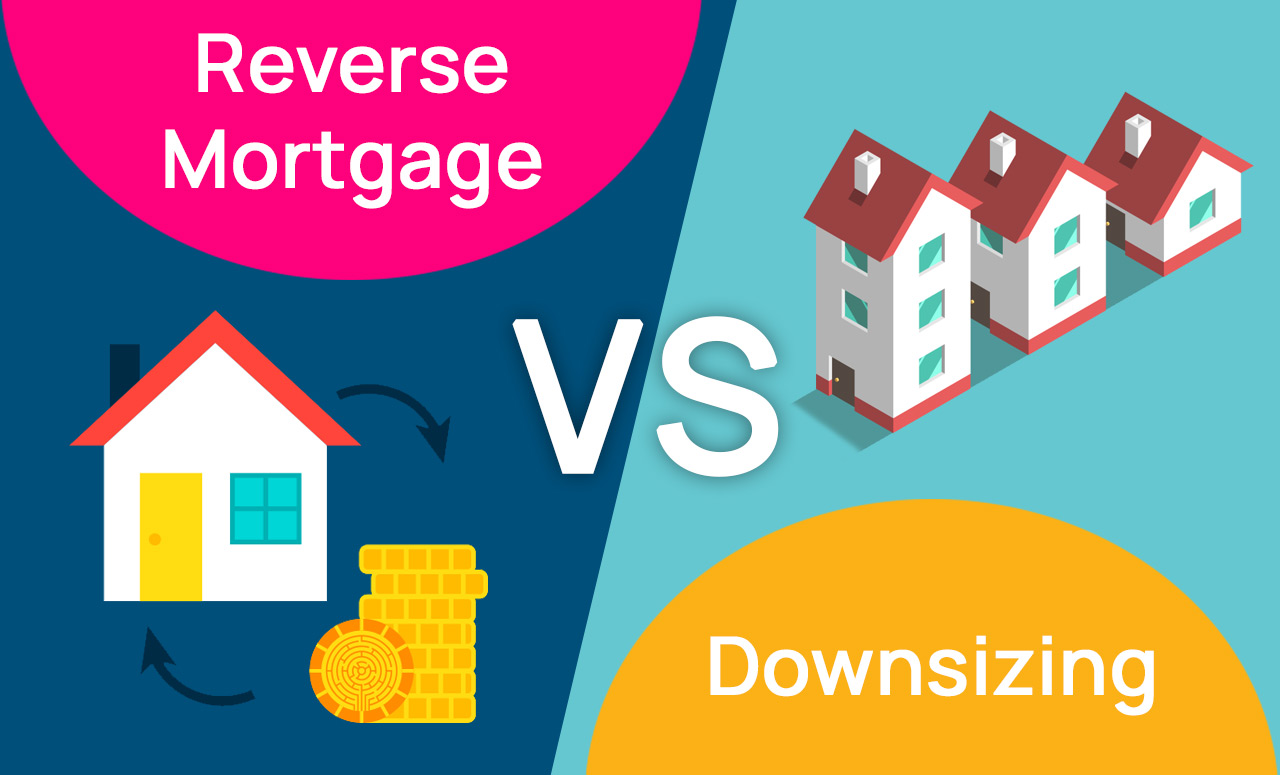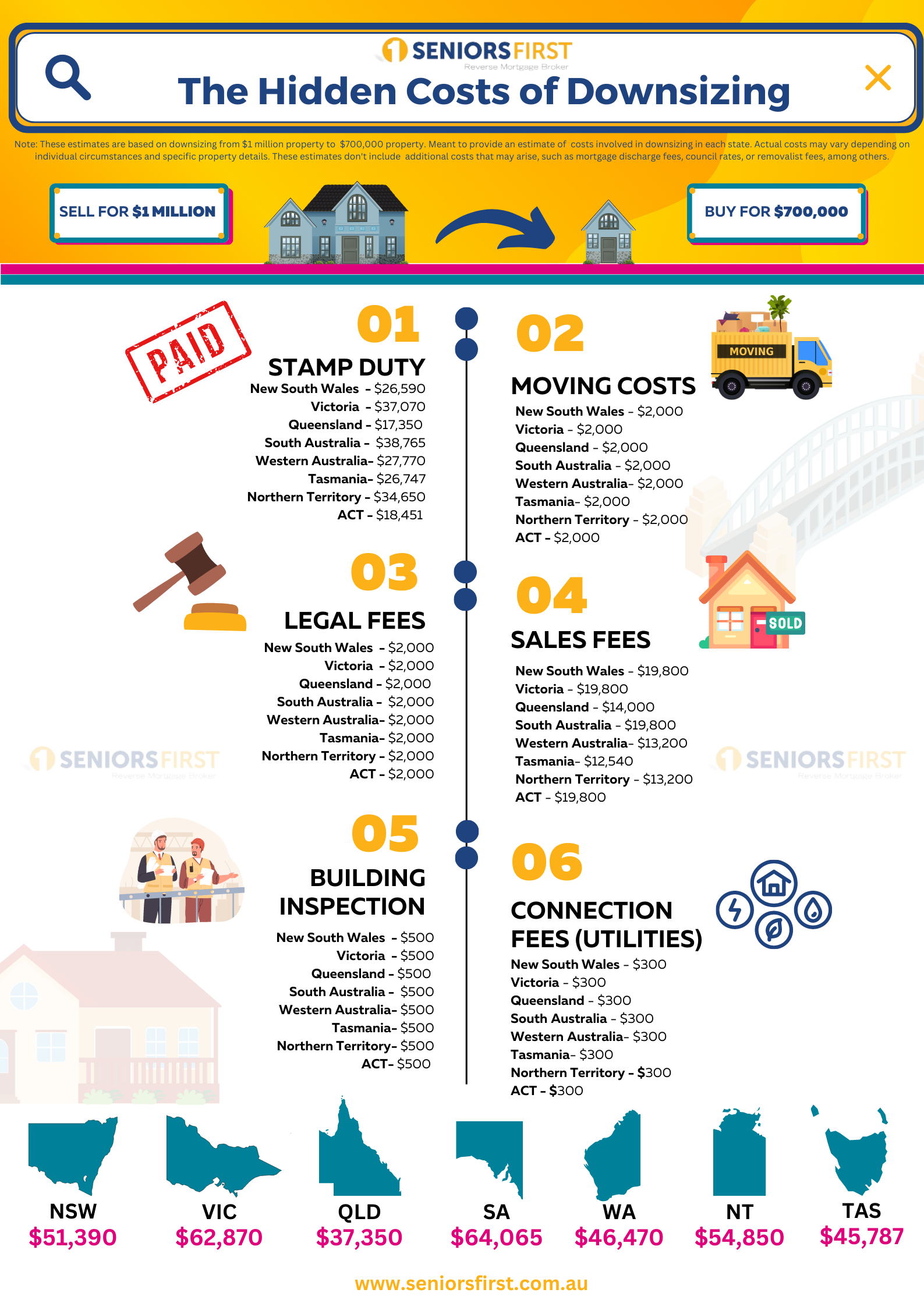As we enter our golden years, financial stability becomes crucial for maintaining a comfortable and enjoyable retirement.
In search of ways to ease monetary stress and maintain independence, two popular solutions have emerged in recent years for seniors: Reverse Mortgages and downsizing.
As of 2021, the Australian Reverse Mortgage market was worth around AUD $3.5 billion, reflecting the growing popularity of this financial solution among seniors. Meanwhile, a 2020 Australian Housing and Urban Research Institute study found that around 30% of Australians aged 50 and above had downsized their homes.
In this blog post, we will dive into the world of Reverse Mortgages and downsizing, comparing their benefits and drawbacks, and ultimately helping you decide which option is best for your retirement.
We will explore topics such as assessing your financial situation, the impact on government benefits, and maintaining your lifestyle, providing you with the information you need to make an informed decision and secure your financial future during retirement.
First, Let’s Understand Reverse Mortgages
Reverse mortgages have become an increasingly popular financial solution for retirees in Australia, allowing homeowners aged 60 and over to tap into the equity built up in their homes without having to sell or move.
A Reverse Mortgage works by providing a loan to the homeowner, with the loan amount based on the value of the property and the borrower’s age. You can receive the funds as a lump sum, regular income stream, or a line of credit.
One of the key advantages of Reverse Mortgages is that the loan repayment is deferred until the homeowner sells the property, moves into aged care, or passes away.
In addition to providing retirees with extra income, Reverse Mortgages can offer other benefits, such as tax-free payments and the ability to stay in their own homes, thus maintaining their independence and social connections.
However, it’s essential to consider potential drawbacks, such as accrued interest and the impact on inheritance, before choosing this option.
To learn more about Reverse Mortgages, download this FREE Guide.
The Downsizing Dilemma
Downsizing has become an increasingly popular option for retirees in Australia. This approach involves selling one’s current home and moving into a smaller, more manageable property, which can have various implications for a retiree’s lifestyle and finances.
One of the key reasons retirees consider downsizing is to unlock the equity in their larger homes by purchasing a smaller, less expensive property. This can provide additional funds to supplement retirement income. There is now a downsizer tech platform that can help find you the right property and assist with the downsizing process.
Additionally, smaller homes typically come with lower maintenance costs, utility bills, and property taxes, which can help ease financial stress during retirement. A smaller living space can also lead to a simplified lifestyle, allowing retirees to focus on leisure activities and enjoy their golden years.
However, there are some challenges to consider when downsizing. Leaving a family home filled with memories can be emotionally challenging for some retirees, and the process of moving can be expensive.
Costs such as agent fees, stamp duty, and relocation expenses can offset some of the financial benefits of downsizing. Furthermore, depending on the location and housing market, it may be difficult to find a suitable smaller property that meets a retiree’s needs and preferences.
As retirees weigh their options, it’s essential to evaluate the potential impact of downsizing on their lifestyle, finances, and long-term goals before making a decision.
Seniors First has created the following infographic to aid you in evaluating whether downsizing is the optimal choice for your circumstances:
Note: Stamp duty relief is provided for downsizers in Victoria, allowing them to save up to $12,750.
Compare Cost and Benefits
When deciding between a Reverse Mortgage and downsizing, it’s important to carefully compare the costs, benefits, and potential risks of each option. Each has distinct implications for your retirement finances and lifestyle.
For example, let’s say you are a 70-year-old retiree living in your family home worth AUD $600,000. If you opt for a Reverse Mortgage, you could access around 20-25% of your home’s value, providing you with an additional AUD $120,000 to $150,000 to support your retirement. You can stay in your home, maintain your lifestyle and community connections. However, interest on the loan will accumulate, reducing the equity in your home over time and potentially impacting the estate’s value.
On the other hand, if you decide to downsize by selling your home and buying a smaller property worth AUD $700,000, you could free up AUD $500,000 after selling costs. This could supplement your retirement income, and you would potentially have lower ongoing costs. However, the process of moving could be stressful and expensive, and you need to adjust to a new community.
By comparing these costs and benefits, you can make a more informed decision that aligns with your financial goals and lifestyle preferences.
Consulting with financial and real estate professionals can also help you navigate the complexities of each option.
Assess Your Financial Situation
Assessing your financial situation is a crucial step when deciding between a Reverse Mortgage and downsizing as a solution for your retirement.
Understanding your current financial status will help you determine which option aligns better with your needs and long-term goals.
For example, let’s say you are a retired couple living in a large family home in Sydney. You need to review your income sources, including superannuation, pensions, investments, and part-time employment. You also need to analyse your current expenses, such as housing, utilities, healthcare, insurance, and leisure activities. This will help you understand your financial health and identify potential shortfalls.
What if you want to travel during retirement? In this case, you need to set a realistic retirement budget that will take into account your financial goals and potential changes in your circumstances, such as increased healthcare costs or reduced income sources.
Once you gain a deeper understanding of your financial situation, you can compare the benefits and drawbacks of a Reverse Mortgage and downsizing. You can now consider whether accessing your home equity through a Reverse Mortgage can provide you with enough funds for your travel plans or if selling your home and moving to a smaller, more affordable property would be a better choice.
In this process, consulting with financial professionals can be invaluable, ensuring you can make an informed decision that supports your retirement goals and financial well-being.
Review Tax Implications
Understanding the tax implications is a key aspect when choosing between a Reverse Mortgage and downsizing for Australian retirees. Each option has different tax outcomes that can significantly impact your financial situation.
In the case of Reverse Mortgages, as of April 2023, the payments retirees receive are generally tax-free and not considered income for the Australian income tax system. This means that a Reverse Mortgage can provide an additional source of income during retirement without increasing your income tax liability.
On the other hand, downsizing involves selling your property, which could potentially result in a capital gain. While the main residence is often exempt from capital gains tax (CGT) in Australia, if you’ve used part of your home to produce income (for example, by renting out a room), you may be partially liable for CGT.
But in 2022, the Australian Federal Government introduced the Seniors Downsizing Incentive Scheme that offers incentives for elderly individuals to downsize their homes. This includes an extended asset test exemption and a tax break on home sale proceeds for pensioners.
Through the scheme, seniors may qualify for the ‘downsizer contribution’ into superannuation, which allows individuals aged 65 and over to make a contribution of up to $300,000 (couples can contribute up t $600,000) from the proceeds of selling their home, and this is not subject to the usual super contribution restrictions.
Given the complexity of tax laws, it’s advisable for retirees to consult with a tax professional to understand the implications fully and make an informed decision.
Know the Impact on Aged Pension and Government Benefits
The Australian Aged Pension and other government benefits play a crucial role in many retirees’ income. Therefore, understanding how a Reverse Mortgage or downsizing can impact these benefits is essential.
If you are a homeowner your asset value limit is lower than someone who does not own their residence. The asset value limit is the amount of assets a person can own before their pension or payment will reduce from the maximum rate under the assets test.
As of April 2023, the asset value limit for a single service pension homeowner is $280,000 and for a single service pension non-homeowner is $504,500. The current maximum rate of single service pension is $1,064.00.
A single homeowner on service pension has $518,750 in assets. Their rate of pension under the assets test would equal $347.75 a fortnight.
If the same person was a non-homeowner their rate of pension would equal $1,021.25 a fortnight.
On the other hand, if you choose to downsize, selling a high-value home and purchasing a lower-value property could potentially increase your Age Pension payments. This is because the value of the new home may be lower, reducing your assessable assets.
However, any money leftover after buying a new property is considered a financial asset and could affect your pension.
It’s essential for retirees to consult with a financial advisor to understand how these options could impact their pension and other government benefits, ensuring they make a decision that best supports their financial wellbeing in retirement.
Maintaining Your Lifestyle and Independence
Maintaining your lifestyle and independence is an important consideration when choosing between a Reverse Mortgage and downsizing.
According to a 2021 Australian Institute of Health and Welfare report, at least 80% of Australians aged 65 and over lived in private dwellings, illustrating the importance many retirees place on maintaining their independence and lifestyle during retirement.
Choosing a Reverse Mortgage allows you to stay in your home, preserving your community connections, routines, and lifestyle.
After all, many seniors don’t want to just leave their homes after spending happy memories with their family. A Reverse Mortgage could allow you to maintain your lifestyle while supplementing her retirement income.
However, downsizing can also offer benefits. Moving to a smaller home can reduce maintenance stress and costs, freeing up time and resources for hobbies, travel, or other pursuits.
The key is to evaluate which option aligns best with your lifestyle preferences, social needs, and overall well-being.
Reverse Mortgage Providers and Downsizing Services
When considering a Reverse Mortgage, it’s essential to select a lender that is a member of the National Consumer Credit Protection Act and adheres to the guidelines set out by the Australian Securities and Investments Commission (ASIC). Some well-known lenders in Australia include Heartland Seniors Finance, IMB Bank, and P&N Bank.
When it comes to downsizing services, choose a reputable real estate agent who is experienced in working with retirees and understands your specific needs. Services like Downsizing.com.au and Senior Moves Australia specialise in assisting seniors with the downsizing process.
Before making a decision, it’s advisable to compare different providers, considering factors like their reputation, terms and conditions, and customer service. Reading reviews and getting recommendations from trusted sources can also be helpful.
Remember to consult with a financial advisor to understand the implications fully and make a well-informed decision that aligns with your retirement goals and financial situation.
Be Sure to Seek Legal and Financial Advice
Making significant financial decisions, like opting for a Reverse Mortgage or downsizing, can have lasting impacts on your retirement lifestyle and financial stability. Therefore, seeking professional legal and financial advice is crucial.
Legal and financial advisors can provide insights into the potential implications of a Reverse Mortgage or downsizing, considering factors such as tax, pension eligibility, estate planning, and future healthcare needs. They can help you understand the fine print in contracts, especially in the case of Reverse Mortgages, where terms and conditions can be complex.
The key takeaway is that while Reverse Mortgages and downsizing can provide financial relief in retirement, it’s essential to seek professional advice to fully understand the implications and make the best decision for your circumstances.
Prepare for the Future
As you move into your golden years, preparing for the future becomes more critical than ever.
Whether you choose a Reverse Mortgage or downsizing, making the most of your retirement years involves careful planning and wise decision-making. It’s about more than just finances; it’s about living a fulfilling and independent life.
The key is to align your financial decisions with your personal goals and values. Invest in your health and well-being, maintain strong social connections, and engage in activities that bring you joy and fulfilment.
Preparing for the future isn’t just about financial security, it’s about building a lifestyle that brings you happiness and contentment in your retirement years.
Remember, a financial advisor can help you navigate these decisions, but ultimately, the best choice is the one that supports your retirement dreams and financial wellbeing.
Disclaimer: This article is for informational purposes only and does not constitute financial advice. Please consult a licensed financial advisor before you make any decision.




I agree that downsizing is a better solution than reverse mortgage from a finanacial perspective but you have to consider the mental aspect of leaving the home you have live in over your married life and the joy you get from maintaining the property which keeps you healthy as well as the friends you have made in the area you live in.
I have experienced both aspects having obtained a reversed motgage to make a number of alterations and improvements to my property as i did not have the cash to do it.
Later I sold my home and downsized to an over 50's village and had plenty of cash to invest and do some travels. My point is I miss having my own block of land and space to move about in and not have to feel confined due to the village set up.
Probably my mistake was not buying a smaller home on its own block for my peace of mind.
Hope my comments are of interest.
Kind Regards
Alan.
Hi Alan,
Thank you for leaving a comment on our website and for your point of view.
We hope you have a lovely day.
Kind Regards,
Seniors First
I have had to get a reverse mortgage due to a family member reneiging on paying back a $53,000 loan, even though they are now financially able to. Reverse mortgages are a Godsend for someone in my situation, however I think the higher interest charged is very unfair and I think the government should regulate this.
Hi Loris,
Thank you for leaving a comment on our website. We do appreciate and we are so glad you found relief from a reserve mortgage. We do also appreciate your input in relation to the interest rate.
All the very best,
Kind Regards
Seniors First
Thank you for the above informative, easy to understand article which was most useful to me.
Hi Ezra,
Thank you for leaving a comment on our website.
We are so glad you found this information useful.
Have a great day.
Seniors First